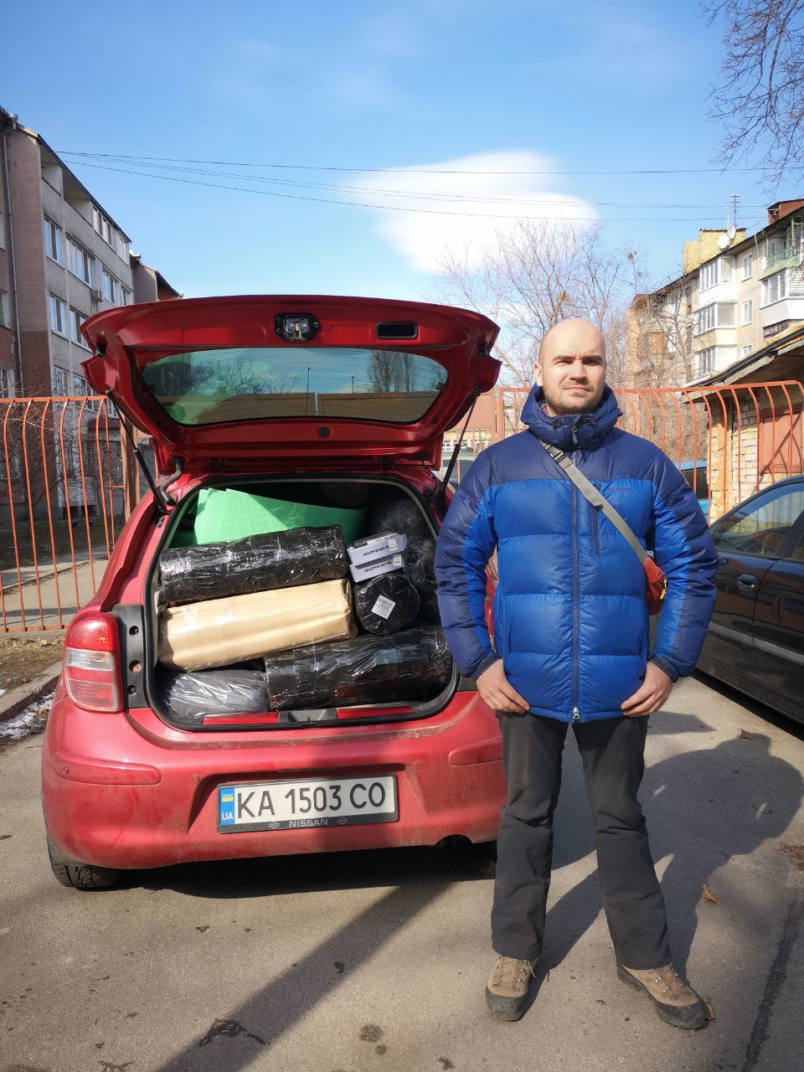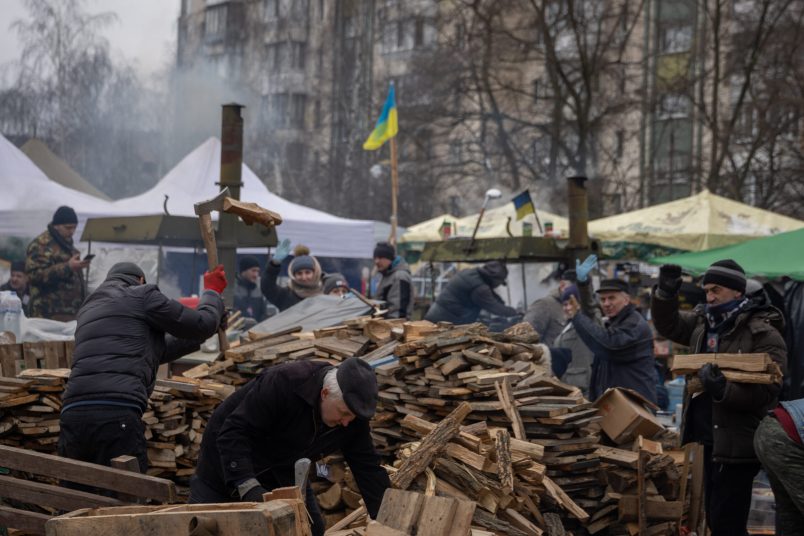Over the past two weeks, Ukrainian society has been transformed.
People have mobilized, transitioning from living normal, modern lives to making impossible decisions: do I leave my life behind and seek safety as a refugee? Or do I stay and apply whatever skills, supplies, or know-how that I have to supporting the war effort, risking death in the process?
One example is Vitalii Khalimonchuk, the founder of a Kyiv-based adventure tourism company, who I spoke with recently. He initially sought to join the forces defending the capital city, but was turned away.
But as the operator of a company that has organized trips across Europe and even to Mount Kilimanjaro, he found a way to put his skills to use around the corner. In an old bomb shelter in a school basement near his house, he found groups of women and children sheltering.
Khalimonchuk realized that the sleeping bags and mats that he used for the camping trips he hosted might be helpful to those who were displaced. The equipment and rations, that he had stashed away could go to the army or the territorial defense forces — civil battalions created in Ukraine to defend the country.
Off they went — sleeping bags for civil defense battalions and bomb shelters, rations for everyone who needed them.
That episode sent Khalimonchuk down a path toward helping the war effort from behind the front lines, part of an informal group of civilians working to keep supplies moving as the country tries to hold off Russia’s advance.
“It’s incredibly uncomfortable for me to sit at home as all this is happening, watching the TV,” he said.
He’s just one of many Ukrainians who have uprooted their lives and redirected whatever they had to supporting the war effort.
In Khalimonchuk’s case, the war began with him in Ukraine’s capital, geared up and ready — not for war, but to lead a hiking trip in the Carpathian mountains in Ukraine’s west.
Then the bombs started falling. His girlfriend left Kyiv, driving to Europe. Khalimonchuk went to his local military recruitment office, and found a line of 150 people.
“We’re only taking people with military experience,” he was told. They took his name down, and Khalimonchuk went home, feeling like he had to do something. That’s when he realized his tour company’s supplies could be of use.

Over the week, as Khalimonchuk’s stock ran low, he started to ask people in the shelters and at military checkpoints: what do people need?
“It wasn’t coordinated from above, it came up from below,” he said.
Now, Khalimonchuk is one of many volunteers involved in transporting goods within Ukraine to people who need them, and products from outside of Ukraine for the country’s soldiers. Scopes, dog food, warm clothes — it’s a national courier system that’s formed as the Russian army tries to shut down supply routes.
Though he’s not on the front lines, volunteers like Vitalii take a massive risk. Last week, three volunteers working as part of the same effort were shot and killed outside Kyiv as they tried to deliver pet food to a dog shelter.
“There was a notice in our group to take the food,” he said. As the volunteers were on their way, they were attacked.
“They just shot them,” he said. One of those killed was a friend of his sister.
Khalimonchuk has family in Crimea and in Russia; they refuse to believe the pictures of destroyed buildings, dead children that he and other relatives send them.
In the months leading up to Putin’s declaration of war, Khalimonchuk himself hadn’t really believed that the Russians would attack. Like everyone else on Feb. 24, he had heard the reports of an imminent Russian invasion, and knew that they had intensified in the two weeks before.
“I think I subconsciously denied that the war would happen,” he said. “Even for Putin, Kyiv is the Mother of Russian Cities — it was impossible to imagine that he would try to destroy it, as he is doing now.”
It was a common sentiment. Russia had been threatening Ukraine for eight years before the Feb. 24 invasion — why would this build-up be any different? And besides, a full-scale war would destroy the historical monuments that, in the Russian view, bind the two countries together. It would be fratricidal, impossible to comprehend.
Even now, two weeks into the war, Khalimonchuk can’t really fully bring himself to understand what’s happening. It’s like a video game, or a dream, he said — something still vaguely unreal, an organ that the body won’t accept.
“In 2019, I went to Burning Man,” he said. “I really thought that this was impossible in the modern world.”
His grandmother, who lives in Ukraine near the border with Belarus, remembers World War II and, he says, still can’t believe that she’s living through it all again, this time at the hands of the Russians.
“I would want this to end as soon as possible, but not at the price of giving in to Russia,” he said. “We can’t give in after all they’ve done to us.”







Putin thinks he can break the Ukrainians’ resolve by being incredibly cruel to them. That never works. The more cruel the Russians become, the more determined Ukrainians will be to fight them. This is why Putin can’t possibly win. He trying to put out a fire with a blow torch.
Putin is fighting a trucker convoy war. Pointless, based on fake news, steeling the resolve of those impacted, and bound to fail.
Wonder how soon a Berlin Airlift type operation will be needed to feed the trapped Ukrainians? Has Russia achieved air superiority over the entire country?
Do they really refuse to believe their own eyes, or is it just the doublethink necessary to stay out of the gulag?
Anyway, Josh K. is the best. Thanks as always for your insight and local color on this stuff.
“Bound to fail”
…already failed.